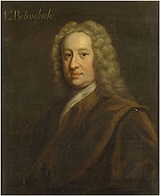
Henry St John, 1st Viscount Bolingbroke
Henry St John, 1st Viscount Bolingbroke (September 16, 1678 – December 12, 1751) was an English statesman and philosopher.
Sourced
- Truth lies within a little and certain compass, but error is immense.
- Reflections upon Exile (1716)
- I have read somewhere or other, — in Dionysius of Halicarnassus, I think, — that history is philosophy teaching by examples.
- On the Study and Use of History, letter 2. See Dionysius of Halicarnassus (quoting Thucydides), Ars Rhet. xi. 2, says: "The contact with manners then is education; and this Thucydides appears to assert when he says history is philosophy learned from examples."
- Nations, like men, have their infancy.
- On the Study and Use of History, letter 4 (1752).
- They (Thucydides and Xenophon) maintained the dignity of history.
- On the Study and Use of History, letter 5 (1752). Compare Henry Fielding, Tom Jones, book xi. chap. ii.; Horace Walpole, Advertisement to Letter to Sir Horace Mann; Thomas Babington Macaulay, History of England, vol. i. chap. i.
- The landed men are the true owners of our political vessel, the moneyed men are no more than passengers in it.
- Some Reflections on the Present State of the Nation (1753)
- It is the modest, not the presumptuous, inquirer who makes a real and safe progress in the discovery of divine truths. One follows Nature and Nature's God; that is, he follows God in his works and in his word.
- Letter to Alexander Pope. Compare: "Slave to no sect, who takes no private road, But looks through Nature up to Nature’s God", Alexander Pope, Essay on Man, epistle iv. line 331.
- The shortest and surest way of arriving at real knowledge is to unlearn the lessons we have been taught, to mount the first principles, and take nobody's word about them.
- As quoted in Treasury of Wisdom, Wit and Humor, Odd Comparisons and Proverbs (1891) by Adam Woolever
Unsourced
- Patriotism must be founded on great principals and supported by great virtue.
- Pride defeats its own end, by bringing the man who seeks esteem and reverence into contempt.
- The greatest art of a politician is to render vice serviceable to the cause of virtue.
